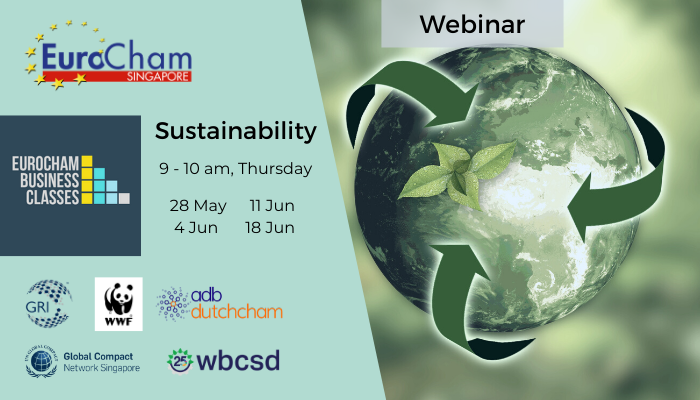

Business Classes – Sustainability: Sustainable Finance: Why it matters to companies
Sustainable Finance: Why it matters to companies
Never before have climate change and natural capital been as central to discussions by finance sector leaders as they are today. Financial institutions which lend to, invest in and insure companies across all industries and geographies have a key role to play in driving the transition towards a low-carbon and sustainable world. By integrating Environmental, Social and Governance (ESG) analyses into their practices they can reduce risks to their portfolios, enhance value creation and accelerate change in the real economy. If the business case for ESG integration in lending and investment practices is now established, how does the growth of sustainable finance impact corporates?
In this session we will go through a series of key sustainable finance concepts and answer the following questions:
- What are the drivers and next frontiers of sustainable finance?
- What are the finance sector’s expectations for Asia?
- The environmental issues financial institutions are focusing on
- Impact on companies and sectorial examples
About the speakers
 Anders Nordheim
Anders Nordheim
Vice President
WWF Singapore
Anders Nordheim is a Vice President of Asia Sustainable Finance at WWF based in Singapore. Previously, Anders led the UNEP Finance Initiative ecosystems thematic, including the Natural Capital Finance Alliance secretariat and the development of the ENCORE tool to integrate natural capital risk into finance sector decision making. As head of policy and research at Eurosif he was responsible for a number of EU policy initiatives and research reports including the European SRI Study 2012. He also worked on ESG analysis with RiskMetrics Group and MSCI, and has experience from private wealth management.
Anders has a Master’s degree in Applied Economics from the University of Cape Town, with a focus on natural resource economics and applied international trade.
 Marie Gauthier
Marie Gauthier
Assistant Vice President
WWF Singapore
Marie is part of the WWF Asia Sustainable Finance Team. She leads the team’s Responsible and Sustainable Portfolios (RESPOND) work and engages with investors to support the creation of portfolios aligned to the Paris Agreement and the Sustainable Development Goals. Previously, Marie led PwC Singapore’s Corporate Responsibility strategy and programmes. Her main responsibility was to improve the firm’s environmental performance and drive community engagement projects. Prior relocating to Singapore, she was part of PwC Luxembourg’s Advisory Team where she developed long term sustainability roadmaps for international companies and public institutions. Marie holds a MSc in management from EM Lyon Business School and a Master of Research in environmental management from Ecole Nationale Supérieure des Mines de Saint-Etienne.
WWF Asia Sustainable Finance
For more than 60 years, WWF has been one of the world’s leading conservation organizations. WWF engages with governments, businesses, financial institutions and communities across 100 countries to support the transition to a resilient and sustainable future, where businesses and societies thrive while protecting natural capital.
WWF has worked with the finance sector for more than a decade via innovative collaborations that seek to integrate ESG risks and opportunities into mainstream finance so as to redirect financial flows to support the global sustainable development agenda. Our approach to sustainable finance leverages WWF’s conservation expertise as well as our partnerships with companies on key issues such as water, energy, climate and food to drive sustainability. Positioned at the cutting-edge of sustainable finance internationally, WWF contributes directly to leading initiatives, including the European Commission’s Technical Expert Group on Sustainable Finance, the Net-Zero Asset Owner Alliance, the Science Based Targets initiative for Financial Institutions and the development of an international green bonds standard. WWF also works directly with banks, asset managers, asset owners, financial regulators and industry associations across the world to drive system-level change.
Based in Singapore, the WWF Asia Sustainable Finance core team acts as the regional hub for our finance sector engagement and develops and co-executes WWF’s Sustainable Finance strategy throughout seven ASEAN countries (Singapore, Malaysia, Indonesia, Myanmar, Philippines, Vietnam, and Thailand); with an additional focus on Japan, South Korea and China.
Registration
You could register yourself via the EuroCham website, here.
